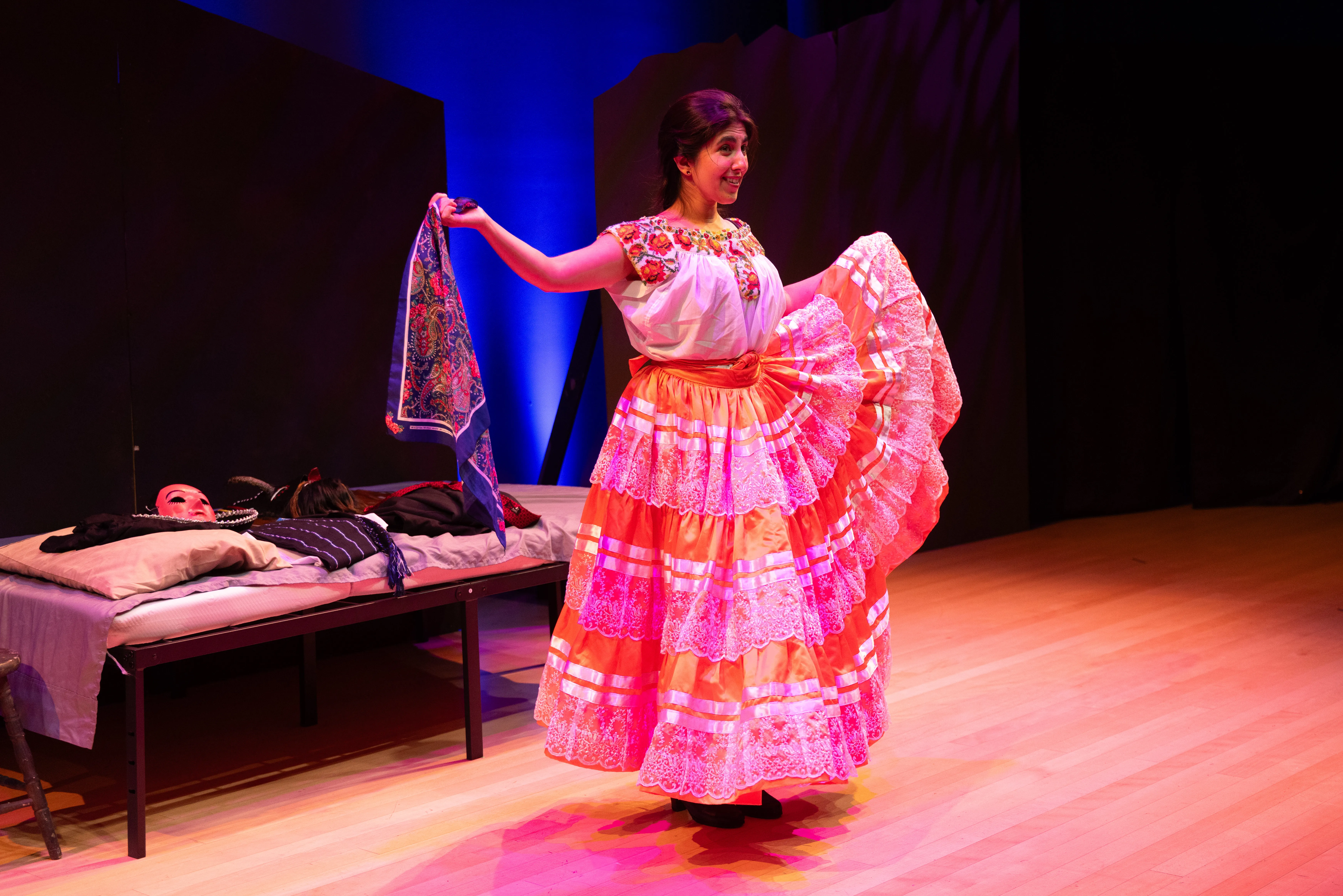A deeply personal and poignant ode to sacrifice, vulnerability and change, playwright and director Ali Namayandeh mastered the balance of science and art in his latest piece of eco-theater, “Hidden Strawberries.”
The play delivered a riveting, heartbreaking and deeply inspirational meditation on the interconnectedness of people, nature and policy that moves even the coldest heart. It debuted at Stanford Live Bing Studio from Oct. 16 to Oct. 19, supported by the Doerr School of Sustainability and the Burt McMurtry Arts Initiative Fund.
Set against a backdrop of the increasingly toxic environmental circumstances accompanying California wildfires, “Hidden Strawberries” follows 19-year-old, Valentina, played by San Jose-based actress Luna Lau, as she migrates to California in search of her long-lost brother, Rodrigo, who disappeared while trying to cross the U.S. border.
This proves a much more difficult task than she imagined: the young woman’s life becomes deeply entwined with that of a strawberry farm. She finds herself working arduous hours in the increasingly toxic California air.
Lau and the supporting cast demonstrated outstanding talent as they told Valentina’s story through song, dialogue and her true passion for dance.
Lau frequently broke the fourth wall, welcoming audience members onto the stage and into the story. She invited us to dance with her as she recounted her humble childhood in Mexico and looked us straight in the eye when describing the life Rodrigo chased when departing for California. I came to understand that Valentina’s family is all she has while listening to the great things Rodrigo told her of California, the sacrifice she saw her father make for work and the memories she has of both of them. Her dances are how she preserves her memories of Mexico and her family from thousands of miles away.
Beyond that, it is the play’s excellent writing and directorship that truly enables us to share in Valentina’s emotions: the minimalist staging and simple props direct our focus toward Lau’s performances and the play’s overall message.
Lau’s expressions and movements oozed frustration and despair, as she re-enacted the conversation in which she learned of her brother’s fate. As she reached toward the crowd, lost in longing, I felt like I was trapped in that tiny farm room with her. I wished I could personally find and deliver answers to her. More than anything, perhaps, I shared in her helplessness: hers as an undocumented immigrant, mine as a useless audience member.
Through her monologues, we continued exploring her confusion and desperation. All the while, sound director Alicia Crawford constantly reminded us of the worsening conditions through which Valentina worked. The first scene after intermission featured a vibrant dance routine and lively Mexican music, treating the audience to a welcome escape of color and beauty.
This moment is fleeting, however, as we soon find ourselves in pitch black darkness, surrounded by news broadcasts and political analysts announcing unprecedented record-high levels of toxic smoke. In the subsequent scene, Valentina picks berries in these conditions — masked and ill. It is scenes like these, which blend scientific research and Valentina’s human journey, that create an emotional and intellectual draw that lingers long after the curtain falls. I walked away wondering about all the other farmers upon whom Valentina was based, forced to suffer invisibly.
At the end of the day, Valentina’s journey served as an entry point into a larger narrative of exploitation, survival and vulnerability; the second act expertly drilled into these topics.
Climate disasters exacerbate already harsh labor conditions for California farmworkers — especially those who are immigrants. We witnessed this as Valentina developed a respiratory illness which she lacked the funds to treat. Her monologues grew increasingly shorter and interrupted by coughs.
“I’m sorry,” she told us at one point. “It is so smoky.”
To make matters worse, one of her bosses, Sin Cara, sexually harasses Valentina while she is ill — leading to her losing her job at the farm. Nevertheless, Valentina manages to learn the truth of her brother’s disappearance, years after first embarking on her journey.
But like many things in life, this victory is soured with complexity. Forced to choose between reuniting with her family and the slim chance of achieving her dream to dance, Valentina’s final decision to stay in America represents the complicated realities of thousands of invisible laborers whose efforts feed the nation.
The play does more than just inform — it urges us to act. Perhaps my favorite line comes when our hero describes being separated from her father.
She says, “The next time my father left, I did not cry. I knew how to wait for someone.” There is a Valentina in all of us, and just as she demands answers about her brother, we must demand answers from ourselves: when will we stop waiting for change and enact it instead?
As we see from Valentina, who concluded the play with an interactive dance as she moved one step closer to her dream, resilience is always the answer. It is through resilient voices like hers that “Hidden Strawberries” delivers a powerful call to action and elevates eco-theater to new heights.
Editor’s Note: This article is a review and includes subjective thoughts, opinions and critiques.
